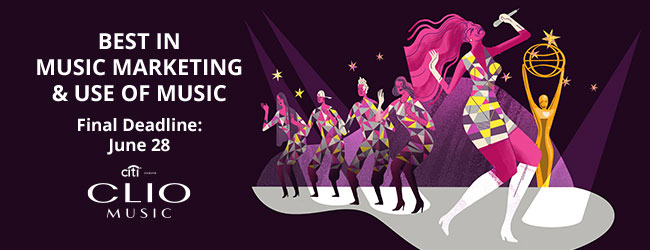We last spoke to the Clio Music team in 2016. Can you give us a refresher about the purpose and mission of Clio Music?
Clio Music is a global awards program celebrating remarkable marketing for artists and music companies as well as the creative use of music in advertising. Clio Music awards are presented annually within a dedicated section of the Clio Awards ceremony and underscores the power of music to connect artists, fans, and brands.
Our mission, which is highlighted year-round on our Muse By Clio platform, is to celebrate creative and original work and to recognize the marketers, music supervisors, and creative teams at agencies, labels, publishers, and brands who are producing work that inspires the fan in all of us.
“Our mission is to celebrate creative and original work and to recognize the marketers, music supervisors, and creative teams at agencies, labels, publishers, and brands who are producing work that inspires the fan in all of us.”
Logistically, Clio Music is a 2-fold program with awards given in Music Marketing for work that promotes an artist, artist’s music, label, or a music brand, product, or service. Mediums in this area include Branded Content, Design (for Events, Packaging, or Printed Materials), Digital/Mobile, Experiential/Events, Film/Video (including Music Video), Film/Video Technique, Innovation, Partnerships & Collaborations, Social Good, Social Media. The other complementary part of the program primarily highlights the creative Use of Music by non-music brands in advertising (licensed, original, or adapted) in commercials, trailers, and other uses.

Michael Kauffman – Director, Clio Music
Clio Music is now 5 years old. How has it progressed in that time?
Overall, the program has grown substantially in both the number of entries and in the available range of mediums, categories and awards.
Initially, we didn’t have a separate medium for the work of non-music brands and agencies who are creatively using music in commercials and trailers, which resulted in submissions to our Music Marketing medium that weren’t a true fit to the categories they were entered in. So, we took that insight and developed a Use of Music medium to highlight that type of entry, which we feel has eliminated a lot of confusion and allowed us to celebrate a ton more great work.
Now, we actually have two distinct juries: one for Music Marketing and one for the Use of Music in advertising; each enlisting a diverse expert panel of accomplished executives from across the industry. We have POVs from record labels, music publishers, DSPs, management and live entertainment companies, agencies, and brands. This year, we have really dynamic group with 18 members on each jury, including Ok Go’s Damian Kulash to provide the artist perspective (Alex da Kid, Andra Day, and Melissa Etheridge were jurors previously).
On a more granular level, each year we evaluate the overall medium and category offerings and make adjustments to the program to simplify the submission process as well as to better align with industry trends. We’ve evolved significantly to reflect areas of importance to the industry, including the addition of mediums and categories like: Branded Entertainment & Content, AR/VR, Music Videos and Teasers/Trailers.
“We’ve evolved significantly to reflect areas of importance to the industry, including the addition of mediums and categories like: Branded Entertainment & Content, AR/VR, Music Videos and Teasers/Trailers.”
We’ve also extended the ways we highlight creativity year-round. Since 2016, we’ve given special honors to a number of exceptional creative forces in the industry, including Blondie, Hugh Evans, Swizz Beats and Scooter Braun. In an effort to celebrate creativity 365-days-a- year, we launched Muse by Clio, a content site focused on creativity that is helmed by veteran advertising journalist Tim Nudd. We’ve also expanded our team, which has enabled us to build partnerships with organizations like The Music Business Association, A2IM, Music Ally, AIMP, and others. We’re continually looking for ways to offer support, connection and recognition across the advertising, brand, and music industries.
What’s new for the awards in 2019?
We’ve added a film/video technique medium within Music Marketing to highlight the craft and skills in animation, cinematography, copywriting, direction, editing, and visual effects.
To better simplify our categorization for video submissions, we’ve also renamed categories based on the length of the work (less than 30 seconds, 31 to 60 seconds, etc.) instead of using terms like short-form and long-form commercials.
Additionally, our Design medium (Packaging, Printed Materials, Event Design) in Music Marketing will now allow for entrants to submit physical components. In many cases, we found that a case study or unboxing video did not adequately capture the magic of the remarkable box sets, deluxe editions and other printed work being released, so it was important for us to provide a means for our entrants to share the actual finished product with our jury if they’d like to.
You have a pretty impressive jury for 2019. What’s their decision-making process?
Thanks. We work diligently to enlist top creative voices across a broad range of perspectives for both juries. They’re tasked with evaluating entries based on two criteria: creativity and originality. We ask them to consider how each idea is creative, original, and inspiring. Is it brave? Bold? Innovative?
We employ a two-step process that allows them to individually evaluate all entries in preliminary rounds online as well as to collaboratively discuss and evaluate work during final on-site judging. Held in NYC over two days in August, each jury gathers to collectively determine the awards given — our Grand, Gold, Silver, Bronze statues and Shortlist accolades.
We don’t employ a minimum nor maximum number of statues to be awarded. This allows the jury to evaluate each entry on its own merits and award as many or as few entries as they see fit in each medium.
Can you talk us through some of the highlights from last year’s winners?
A lot of the 2018 Clio Music winners took music to unexpected places. The “Elton John Legacy” project explored the limitless expanse of virtual reality. Spotify’s “David Bowie Is Here” installation took over a New York City subway station. RCA Records’ re-creation of Jack Antonoff’s childhood bedroom offered an incredibly intimate and compelling portrait of the musician. The space where music can live was a big theme of many winners. In the age of streaming, much of music’s physicality has been lost—these marketing pieces helped put some of it back.
The other big trend among the 2018 winners was social purpose. Examples include gold Clio winners such as Logic’s “1-800-273-8255” anti-suicide anthem, MGM’s “Universal Love” project (which changed the pronouns in love songs to make them same-sex anthems), and Scooter Braun’s “One Love Manchester” benefit following the bombing at the Ariana Grande concert there.
“Social issues are deeply emotional, and music has the intrinsic power to communicate that emotion in a way that most other marketing tools just can’t.”
Who should enter / how do you enter?
Anyone involved in marketing artists, music, music companies, or in using music within advertising or marketing campaigns should consider entering their most creative and original work. Our eligibility window is for work made public from 1/1/18 through 7/19/19, and our final deadline for entries is coming up on June 28th.
You can visit clios.com/music to learn more about our mediums, view our jury members, be inspired by previous winners, and create an account to submit your entry.
How are you seeing the way in which brands are working with music evolve?
Over the past few years the aversion of many artists to work brands has gone away. Some artists once avoided these partnerships in order to not be perceived as selling-out or to eschew collaborations that weren’t genuine. Today, both brands and artists are finding new ways to partner in authentic ways.
“It’s a growth area for the industry fuelling renewed revenue support, creative flexibility, and deeper engagement with fans.”
It’s a growth area for the industry fuelling renewed revenue support, creative flexibility, and deeper engagement with fans. Many marketing and content teams at brands have long understood the power of music to inspire us, it’s now also a crucial part of their overall strategy and story-telling efforts.
In many conversations with jurors, we’ve heard that music integration has shifted from being a latter element in the process to it being crucial for artists and their representatives to have a seat at the table at the outset of creative discussions too.
What are the elements that make really great music / brand collaboration?
Genuine added value for both brand and artist as well as true connection for the fan/consumer – which most often can take the form of creative branded entertainment and content. We as fans hunger for more insights and inspiration from the things we love — we’re seeking quality and connection to brands, personalities and artists. For marketers, music is often the most direct path to fueling that alliance.
“We as fans hunger for more insights and inspiration from the things we love — we’re seeking quality and connection to brands, personalities and artists. For marketers, music is often the most direct path to fuelling that alliance.”
As noted by VML’s Nick Keenan in this Muse post last year: as a medium for emotion and connection, music has no equal. To be successful it needs to be more than just content for the sake of content, and provide remarkable and memorable moments that strengthen the relationship of the consumer and/or fan with the artist.
